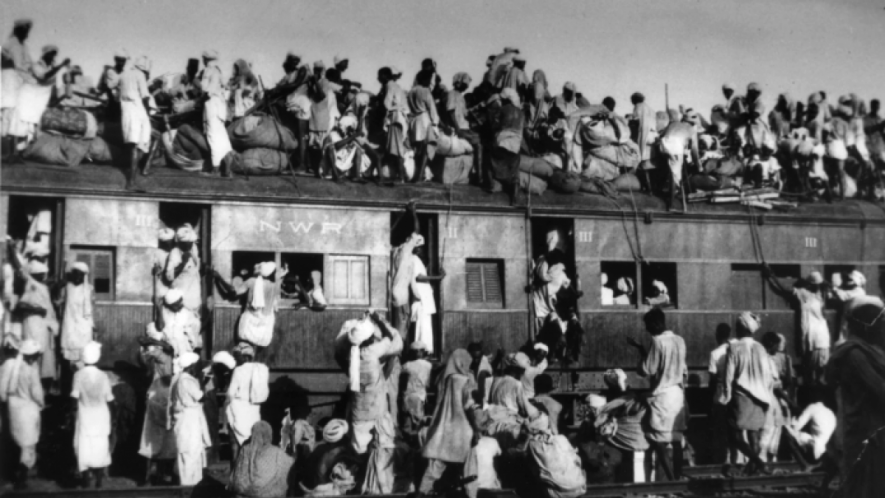Why 14 August is Not the Right Day to Remember Horrors of Partition

Image Courtesy: AP
Prime Minister Narendra Modi’s choice of 14 August as the day to commemorate the Partition reduces the bitter separation of India and Pakistan on the eve of Independence to a single cataclysmic event. The Partition was catastrophic and unfolded over a relatively short period, but was the outcome of a process, not a sudden event.
That is not all. The choice of 14 August, which Pakistan marks as Independence Day, also feeds into the colonial hangover of bitter communal divisiveness. It subtly suggests that the BJP-led regime holds the Muslims, as a collective, responsible for the Partition.
In the selection of 14 August, many will see an attempt to distract from failing to manage the Covid-19 pandemic and economic problems. Their charge would appear plausible, for the Modi government has often deployed history as a weapon to consolidate majoritarian sentiment. To its critics, opportunism and cynical vote-calculus will be unmistakable in the government’s choice of date. For, the cycle of violence during Partition began on 17 August, not the fourteenth.
Due to its potential to stoke discord, we need to renew our understanding of Partition and its causes. An influential columnist recently held the first prime minister Jawaharlal Nehru as responsible for Partition as Jinnah, his Pakistani counterpart. It is one example of reductive over-simplification, but these days, some well-meaning and communalised denizens, Muslim and Hindu alike, find such views palatable.
The point for historians to ponder is why the “causes” of Partition seem more critical today than its consequences. Historian Gyanendra Pandey writes in Remembering Partition: Violence, Nationalism and History in India (2001) that the usual reason for our fixation on what caused the Partition is the desire to find someone to blame—and someone to absolve for it. Instead of this, he insists we concentrate on the horrific consequences of Partition, which still linger. He echoes Mirza Ghalib’s couplet, “Jala hai jism jahaan dil bhi jal gaya hoga/Kured-tey ho jo ab raakh justuju kya hai”.
It will never grow old to reiterate that Partition resulted from competitive communalism, aided, abetted and aggravated by the colonial state and its stooges in the communal organisations, the Muslim League and Hindu Mahasabha-RSS. It is unambiguous that the Muslim League was a more potent force until 1947, and after that, the Mahasabha-RSS grew in strength, particularly in recent decades. Two, India could have been divided only in the presence of the British. It is the British who controlled state power, not the Congress party. Three, the Congress tried its best to prevent Partition. It succeeded in achieving the most extensive territories possible for India. Yes, lower units of the Congress had a majoritarian streak, which surfaced from time to time. However, the All India Congress Committee and Congress Working Committee never adopted a communally divisive resolution. Historian Sucheta Mahajan highlights this in her 2001 book, Independence and Partition: Erosion of Colonial Power in India.
In The Origins of the Partition of India, 1987, Anita Inder Singh underlines how the British turned every attempt to “unify” Hindus, Muslims and Sikhs socially and politically into a miserable failure. The divisions stoked by the colonial power endure across South Asia. Yet, our current rulers refuse to learn a lesson from this history.
Some Indian “nationalist” historiographies strengthened the saffron stereotyping of Muslims by blaming them alone for Partition. They did not articulate Muslim resistance to the Muslim League’s two-nation theory enough. Pakistani “nationalist” historiography—who cannot gain credibility if they articulate Muslim opposition to the two-nation idea—aggravated this.
Contemporary organised hatred towards Muslims in India also stems from cynical and motivated historiography that ignores Muslim resistance to the idea of Partition. However, there is some relatively recent research into this subject. A liberal journalist recently circulated one such list on social media, rightly urging people not to go by what politicians say on Partition. Yet, it misses several volumes that highlight Muslim resistance to communal-separatist politics of the League. It could include Muslim Politics in Bihar: Changing Contours, 2014, by this author, Venkat Dhulipala, Creating a New Medina: State Power, Islam, and the Quest for Pakistan in Late Colonial North India, 2016 (on Uttar Pradesh), Ali Usman Qasmi and Megan E. Robb in Muslims against the Muslim League: Critiques of the Idea of Pakistan, 2017.
Joya Chatterjee’s 1995 and 2009 books on Bengal demonstrate the role of the Hindu Mahasabha in demanding Partition. Neeti Nair’s 2011 work on Punjab and William Gould’s 2005 work on Uttar Pradesh are also relevant. The Partition of India (published in 2018) by Haimanti Roy is an essential reference. Roy’s slim booklet suggests moving Partition’s “history, memories, and legacies” away from a singular narrative to its varied experiences and political trajectories.
She writes, “It would be easy to see the Partition of India as the symbolic culmination of age-old animus between Hindus, Muslims and Sikhs...[However, that] would then erase the narratives of popularity, communal unity, and of human connections that dotted those very paths.”
Strident majoritarian forces, now armed with state power, have a vested interest in absolving themselves of any blame for pre- and post-1947 pogroms. They own up to the violence they are unleashing today, as it is designed to perpetuate them in power. For this reason, they are unrepentant about their dangerously selective amnesia. Their ideologues justify pogroms, in their writings, in what they say, and often in action.
Equally disturbing is the glee among sections of “minoritarians” who have now found reason to celebrate the fall of Kabul to the Taliban on 15 August. Some offer a convoluted narrative to claim that there is a “good Taliban”. They resemble those Muslim notables who heard good things in RSS chief Mohan Bhagwat’s 4 July speech when there weren’t any.
A few months ago, a member of a WhatsApp group I am on shared an excerpt from Women and Islam: An Historical and Theological Enquiry by the Moroccan Islamic feminist Fatima Mernissi. The passage was: “The Prophet persisted in not consenting to the hijab...If women’s rights are a problem for some Muslim men, it is neither because of the Koran nor the Prophet, nor the Islamic tradition, but simply because those rights conflict with the interests of male elite.”
In response, some group members threatened to kill the sharer, while others called it “blasphemy”. The admin of the group—it has 300 members including many government employees and employees of state-funded madrasas—expelled the sharer while the one issuing the threat to kill is still in the group.
Denying minority communalism and misogynism is as dangerous as commemorating Partition as the BJP wants. Competitive communalism in India reflects sub-continental majoritarianism. Both are growing, but there is a shroud of mystery over how western imperial power-play is stoking it. Until this mystery unravels, we can learn from history and what Roy writes: “advocating common regional concerns over political differences and acknowledging the [unifying] common pre-history of 1947 would be a path towards better regional cooperation and moving forward from the trauma of Partition.”
The author teaches modern and contemporary Indian history at Aligarh Muslim University. The views are personal.
Get the latest reports & analysis with people's perspective on Protests, movements & deep analytical videos, discussions of the current affairs in your Telegram app. Subscribe to NewsClick's Telegram channel & get Real-Time updates on stories, as they get published on our website.
























